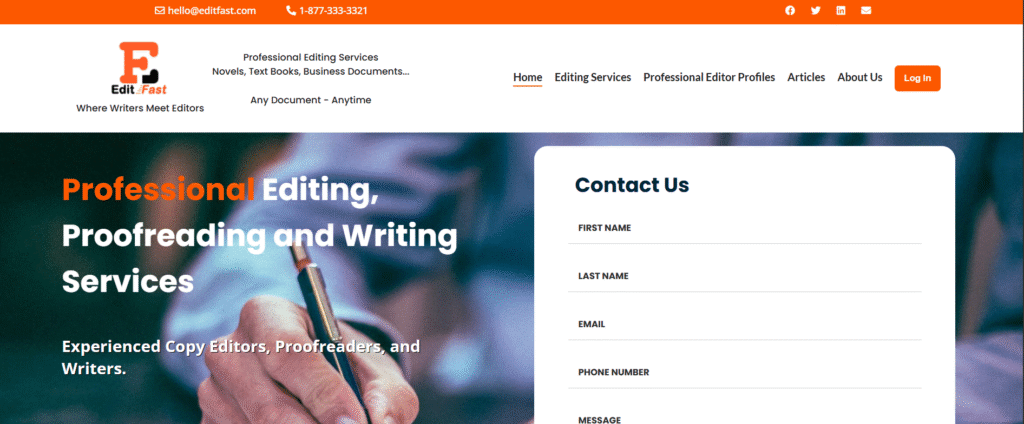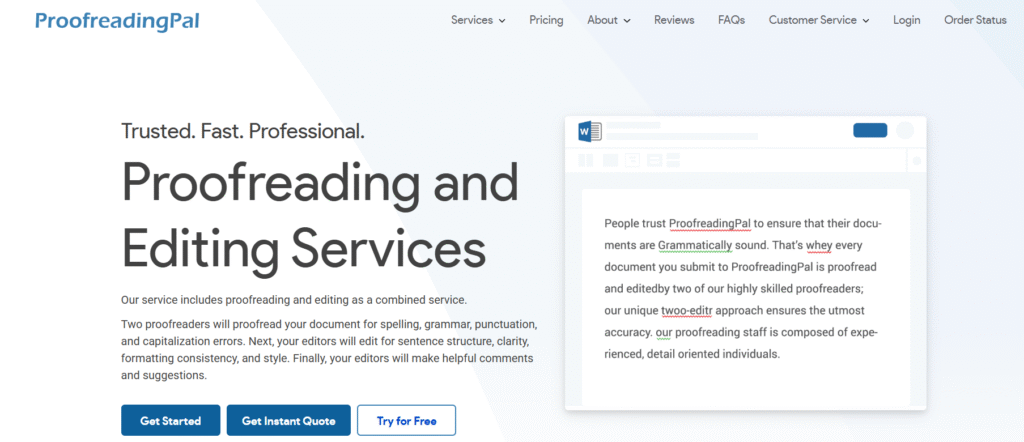20 Best Online Proofreading Jobs For Beginners

So, you’re sitting there thinking about making some extra cash from home, and someone mentioned proofreading? Smart choice!
I’ve been in the finance world long enough to know a good side hustle when I see one, and honestly, proofreading is like finding money on the sidewalk, except you actually have to work for it 🙂
Let me tell you something: I stumbled into proofreading almost by accident three years ago when I needed extra income to pay off some stubborn credit card debt. What started as a desperate attempt to earn an extra $500 monthly turned into a legitimate income stream that now brings in over $2,000 per month. Not bad for someone who just has a decent grasp of English and an eagle eye for typos, right?
The beauty of online proofreading jobs? You don’t need fancy degrees or years of experience. You just need to know the difference between “their” and “they’re” (seriously, you’d be shocked how many people don’t), and you’re already ahead of half the competition.
What Is Proofreading?
Alright, let’s get the basics straight before we dive into the money-making part. Proofreading is basically being the grammar police, but getting paid for it. You’re checking written content for spelling mistakes, grammar errors, punctuation problems, and making sure sentences actually make sense.
Think of it this way: writers create content, editors make it better, and proofreaders make it perfect. You’re the last line of defense between a piece of writing and the public eye. No pressure or anything!
The cool thing is that proofreading covers everything from blog posts and website copy to academic papers and even novels. I’ve proofread everything from cryptocurrency whitepapers to romance novels , talk about variety in your workday!
How Much Do Online Proofreaders Make Per Hour?
Now we’re talking my language, money! From my experience and research across the industry, online proofreaders typically earn between $15-$40 per hour. But here’s the real talk: your earnings depend heavily on your client quality and experience level.
When I started out, I made about $12-15 per hour on those beginner-friendly platforms. Fast-forward to today, and I charge $35-40 per hour for specialized financial content. The key is building your reputation and finding your niche.
Here’s the earning breakdown I’ve observed:
- Beginners (0-6 months): $12-20/hour
- Experienced (6 months-2 years): $20-30/hour
- Specialists (2+ years with niche expertise): $30-50/hour
Some platforms pay per word instead of hourly. Generally, you’ll see rates between $0.02-$0.10 per word, which can translate to decent hourly rates if you work efficiently.
Financial Reality Check: At $20/hour working just 15 hours weekly, you’re looking at $1,200 monthly, which is enough to cover most car payments or knock out credit card debt fast. IMO, that’s pretty solid for a side hustle with zero startup costs.
How To Become A Proofreader
Here’s where most people overthink things. You don’t need to enroll in some expensive course or get certified by a fancy institution. The best way to become a proofreader is to start proofreading.
I know, revolutionary advice, right? But seriously, here’s how I recommend getting started:
Practice on everything. Start with your friends’ resumes, social media posts that make you cringe, or even Reddit comments. The more you practice spotting errors, the faster you’ll become.
Read style guides. Get familiar with AP Style, the Chicago Manual of Style, or MLA, depending on what type of content you want to focus on. I personally started with AP Style since most online content follows those guidelines.
Take online tests. Many proofreading platforms require you to pass tests anyway, so why not practice? There are free grammar and proofreading tests online that’ll help you identify your weak spots.
Start small and cheap. Don’t worry about making big money initially. Focus on building reviews and testimonials. I made $5 for my first job, and guess what? That client ended up giving me regular work worth thousands of dollars over two years.
Tools For Online Proofreading
Let me save you some time and money here. You don’t need to buy every proofreading tool on the market, but having the right ones can seriously boost your efficiency and accuracy.
Grammarly is probably your best friend starting out. I use the premium version ($12/month) because it catches way more errors than the free version. Plus, it explains WHY something is wrong, which helped me learn faster.
ProWritingAid is another solid choice, especially if you’re working with longer documents. It’s about $79/year and offers more in-depth analysis than Grammarly. Perfect for academic or technical content.
Hemingway Editor helps you catch overly complex sentences and improve readability. It’s free online, though I recommend the desktop app ($19.99) if you’re doing this regularly.
Microsoft Word’s Track Changes might seem basic, but many clients specifically request it. Learn to use it properly; it’s a professional necessity.
Google Docs with suggestion mode is increasingly popular with clients. It’s free, collaborative, and most people already know how to use it.
Pro tip: Don’t rely solely on automated tools. They’re helpers, not replacements for human judgment. I’ve seen Grammarly suggest changes that would make content sound robotic.
How To Get Online Proofreading Jobs
This is where strategy meets hustle. There are several ways to land proofreading gigs, and I recommend using multiple approaches.
Freelance platforms are your quickest entry point. Sites like Upwork, Fiverr, and Freelancer have tons of proofreading jobs, though competition can be fierce initially.
Direct client outreach is where the real money is. I spend time each week reaching out to content agencies, small businesses, and bloggers who might need proofreading help. A simple email offering your services can land you regular clients.
Opportunity Cost Insight: Instead of spending 2 hours bidding on low-paying platform jobs, spend that time reaching out to 10 potential direct clients. The math works better long-term.
Social media marketing works better than you’d think. I post writing tips and grammar corrections on LinkedIn and Twitter, which has attracted several clients who found my content helpful.
Networking in writing communities, Facebook groups, and professional associations can lead to referrals. Some of my best clients came through word-of-mouth recommendations.
Content marketing by starting your own blog about writing and grammar can establish you as an expert. It takes time, but the clients you attract this way tend to pay premium rates.
20 Best Online Proofreading Jobs For Beginners
Alright, here’s the meat and potatoes, the platforms where you can actually start making money today. I’ve personally tested most of these, and I’m giving you the real scoop on each one.
1. CACTUS Communications

CACTUS Communications focuses heavily on academic and scientific content, which means higher pay rates if you can handle technical material. I love that they offer steady work once you’re in their system.
What they pay: $20-35/hour for experienced proofreaders
Requirements: Strong academic background preferred, must pass their test
Best for: People comfortable with scientific or medical content
The application process is thorough, but that’s actually good; it means they’re selective about quality, which translates to better pay and more professional clients.
2. Cambridge Proofreading
This platform is premium all the way. Cambridge Proofreading only accepts native English speakers with bachelor’s degrees, but they pay accordingly.
What they pay: $25-40/hour
Requirements: Bachelor’s degree, native English speaker, rigorous testing process
Best for: Highly qualified proofreaders wanting top-tier rates
Fair warning: their hiring process is no joke. You’ll take multiple tests and might wait weeks for a response. But if you get in, the work is consistent and well-paid.
3. Clickworker
Clickworker is more of a general freelance platform, but they have solid proofreading opportunities. What I like is their mobile app; you can literally accept jobs while waiting for your coffee.
What they pay: $10-25/hour, varies by project.
Requirements: Basic English proficiency test
Best for: Beginners wanting flexible, quick jobs
The pay isn’t the highest, but jobs are plentiful and perfect for building your portfolio. Plus, payments are reliable.
4. Domainite
Domainite pays per word rather than hourly, which can work in your favor if you’re fast. At $0.25 per 100 words, you need to be efficient to make decent money.
What they pay: $0.25 per 100 words (roughly $10-15/hour if you’re quick)
Requirements: Complete application and submit samples
Best for: Fast proofreaders who can handle volume
The work is straightforward, mostly website copy and blog posts. Not glamorous, but consistent.
5. EditFast

Here’s where things get interesting. EditFast takes a 40% commission (ouch!), but they handle all the client communication and marketing for you.
What they pay: 60% of what clients pay (clients typically pay $20-40/hour)
Requirements: College degree, professional profile
Best for: Proofreaders who hate marketing themselves
The commission is steep, but some people prefer focusing purely on the work rather than finding clients. It’s a trade-off.
6. Fiverr
Love it or hate it, Fiverr is where many proofreaders get their start. Yes, you might begin with $5 jobs, but I’ve seen people build six-figure businesses on this platform.
What they pay: $5-100+ per project (you set your rates)
Requirements: Just sign up and create a compelling gig
Best for: Entrepreneurial proofreaders willing to start small
The key with Fiverr is patience and persistence. My first month, I made $47. By month six, I was earning over $1,200 monthly. The platform works if you work it.
7. FlexJobs
FlexJobs charges a membership fee ($14.95/month), but here’s why it’s worth it: every job is legitimate, and many are from established companies offering employee benefits.
What they pay: $15-35/hour for most positions
Requirements: $14.95/month membership, professional application
Best for: Proofreaders wanting traditional employment benefits
ROI Reality: Paying $14.95/month for FlexJobs could net you $500+ in your first gig, that’s a 3,200% return. I found my highest-paying client through FlexJobs, a marketing agency that now pays me $40/hour for ongoing work.
8. Freelancer
Freelancer operates on a bidding system, which can be frustrating but also rewarding if you know how to position yourself.
What they pay: Highly variable ($5-50+ per project)
Requirements: Create profile, bid on projects
Best for: Competitive proofreaders good at sales
The key is bidding strategically. Don’t always go for the lowest price; sometimes, positioning yourself as a premium option works better.
9. Gramlee
Gramlee specializes in quick turnaround times, which means higher stress but often better pay rates for rush jobs.
What they pay: $15-30/hour, depending on urgency
Requirements: Pass proofreading test, meet tight deadlines
Best for: Fast workers who handle pressure well
If you can consistently deliver quality work under tight deadlines, this platform can be quite lucrative. Just don’t take on more than you can handle.
10. Guru
Guru has a lower commission structure (9%) compared to some other platforms, which means more money in your pocket.
What they pay: Variable, but you keep 91% of what clients pay.
Requirements: Professional profile, bid on projects
Best for: Experienced freelancers who want to keep more earnings
The interface isn’t as polished as Upwork or Fiverr, but the lower fees make up for it if you can find good clients.
11. Indeed
Indeed isn’t just for traditional jobs; they have remote proofreading positions from legitimate companies.
What they pay: $15-30/hour for most remote positions
Requirements: Varies by posting, usually professional experience
Best for: Proofreaders wanting stable, employee-style positions
I’ve seen everything from part-time flexible positions to full-time remote jobs with benefits. Worth checking regularly.
12. Polished Paper
Polished Paper focuses on academic content, which typically pays better than general web copy.
What they pay: $18-35/hour, depending on complexity.
Requirements: Pass the academic writing test
Best for: Proofreaders comfortable with academic/scholarly content
Academic proofreading requires more precision, but clients generally pay premium rates and provide steady work.
13. ProofreadingPal

ProofreadingPal has strict requirements (US-based, college graduate, 3.5+ GPA), but they offer excellent pay and stability.
What they pay: $500-$3,000/month, depending on workload
Requirements: US resident, college degree, minimum 3.5 GPA, proofreading experience
Best for: Qualified US-based proofreaders wanting a steady income
The barrier to entry is high, but that’s exactly why they can pay well. Less competition means better rates.
14. Proofreading Services
ProofreadingServices accepts international applicants and offers some of the highest hourly rates I’ve seen.
What they pay: Up to $45/hour for experienced proofreaders
Requirements: Pass a 20-minute proofreading test
Best for: Skilled proofreaders wanting premium rates
The test is no joke; they want to see real skill. But if you pass, you’re looking at some seriously good money.
15. Scribbr
Scribbr specializes in academic proofreading and requires native English speakers from specific countries.
What they pay: $25+/hour
Requirements: Native English speaker from select countries, academic focus
Best for: Academically-minded proofreaders with proper credentials
They work with students on dissertations, theses, and other academic papers. The work is meaningful and well-compensated.
16. Upwork
Upwork is the big daddy of freelance platforms. Competition is fierce, but opportunities are endless.
What they pay: $5-100+/hour depending on your positioning
Requirements: Strong profile, portfolio, and ability to win proposals
Best for: Serious freelancers willing to invest in building their reputation
I’ve earned over $50,000 on Upwork across various services. The key is patience, persistence, and constantly improving your profile and proposal writing skills.
17. Wordvice
Wordvice focuses on academic editing and proofreading with competitive rates.
What they pay: $30-33/hour
Requirements: College degree (current students accepted), pass editing test.
Best for: Academically-oriented proofreaders
They specialize in helping non-native English speakers with academic papers, so cultural sensitivity and clear communication skills are valuable here.
18. Scribendi
Scribendi requires fast turnaround times but pays well for experienced editors.
What they pay: Average $27/hour
Requirements: Excellent English skills, ability to edit 1,000+ words/hour
Best for: Fast, experienced proofreaders
The speed requirement is real; you need to maintain quality while working quickly. But if you can do that, it’s steady, well-paid work.
19. ZipRecruiter
ZipRecruiter aggregates job listings from various sources, including many remote proofreading positions.
What they pay: $10-30/hour, typically
Requirements: Varies by posting
Best for: Job seekers wanting traditional employment
Set up job alerts for proofreading positions and apply quickly when good opportunities appear. Many companies post here first.
20. Writer’s Job Shop
Writer’s Job Shop requires an English degree but offers monthly payment and performance bonuses.
What they pay: Competitive rates with bonus potential
Requirements: English degree, and pass the application process.
Best for: Degree-holders wanting steady work with growth potential
The bonus system rewards good performance, so your income can grow as you prove your value.
Pros And Cons Of Proofreading
Let’s be real about this gig. Like any side hustle or career path, proofreading has its ups and downs. After three years in this field, here’s my honest take:
Pros
Flexibility is king. I work when I want, where I want. Beach vacation? Bring the laptop. Sick kid at home? No problem, work around it. This flexibility has been worth thousands in saved daycare costs alone.
Low barrier to entry. You don’t need expensive equipment, special licenses, or years of training. If you can spot mistakes and communicate clearly, you can start earning within weeks.
Scalable income. I started making $300/month and now consistently earn $2,000+. You can take on more clients, raise your rates, or specialize in higher-paying niches.
Recession-resistant. Content creation never stops, and mistakes happen regardless of economic conditions. I actually picked up more work during the 2020 economic uncertainty.
Skill building. Your writing and editing skills improve constantly, which benefits other areas of life and career prospects.
Cons
An income ceiling exists. Unless you build an agency or productize your services, there’s a limit to how much you can earn trading time for money. I hit about $4,000/month before needing to change my business model.
Feast or famine cycles. Some months, you’re turning down work; others, you’re scrambling to pay rent. Building a steady client base takes time and effort. FYI, I recommend saving 20-30% of high-earning months to smooth out the lean periods.
Eye strain is real. Staring at screens for hours daily takes a toll. I invested in blue light glasses and take regular breaks, but it’s still a factor. Budget about $50-100 for a proper ergonomic setup.
Tight deadlines create stress. Rush jobs pay more but can disrupt work-life balance. I’ve learned to charge premium rates (50-100% extra) for urgent requests.
Market saturation in entry-level work. Everyone thinks they can proofread, so competition for basic jobs is intense. You need to differentiate yourself quickly.
Final Thoughts
Online proofreading can be a reliable way to earn extra money if you start small and stay consistent. It’s not a quick path to riches, but with steady effort, you’ll build skills, confidence, and credibility over time.
At first, expect lower pay while you learn and build a portfolio, but each job improves your expertise. With patience, your rates and opportunities will grow, and within a year, you could be earning a solid side income, or even turning it into a full-time business.








